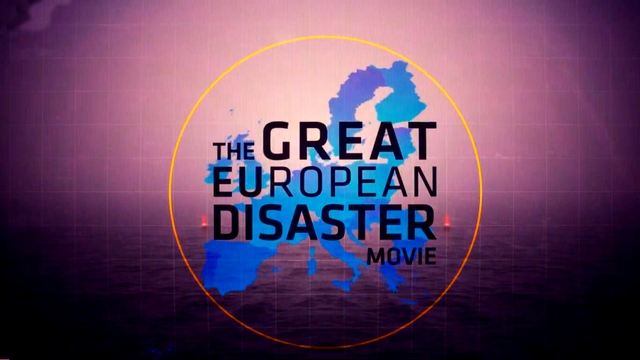The Great European Disaster Movie
Exploring the present crisis facing Europe and a post-EU dystopian future
 In a post-EU future, Nigel Farage and Marine Le Pen have come to power, the Greeks have written off their debt and the Eurozone has collapsed. Flitting between artfully constructed sequences and interviews with commentators, politicians and ordinary people, this powerful documentary shows us the stakes and the possible consequences of the European Union's collapse, and asks: what can we do to save it?
In a post-EU future, Nigel Farage and Marine Le Pen have come to power, the Greeks have written off their debt and the Eurozone has collapsed. Flitting between artfully constructed sequences and interviews with commentators, politicians and ordinary people, this powerful documentary shows us the stakes and the possible consequences of the European Union's collapse, and asks: what can we do to save it?
Cut to 2014. In Spain, grassroots protest is spreading in reaction to the housing crisis. 500,000 have been evicted since the 2008 economic crisis hit, affecting Southern European nations like Spain and Greece especially badly, and sparking large-scale civil unrest in both countries. While left-wing populist parties Podemos and Syriza gain influence in these countries, Northern Europe witnesses a rise of the right. Farage, Le Pen and their like fan the flames of xenophobia, which in turn fuels their rise. As countries turn inward, scepticism about the EU increases. "The Eurozone is becoming a zone of anger and mutual incomprehension. The patience is quite unlikely to last", says Martin Wolf of the Financial Times.
Does Europe still mean anything in this context? For the 800,000 Ukranians who participated in the pro-EU protests in Kiev in 2013 it certainly did. And to other Eastern European nations who are recent members, it still means hope: "We [the newer members] remember what it was like not being able to live in a democracy" says Radek Sikorski, former foreign minister of Poland, adding that their idealism is "giving Europe a new confidence in her own values."
It is a return to precisely these values which is what European Disaster Movie prescribes. But if the EU is to be prevented from imploding on itself, the filmmakers argue, we must act fast.







